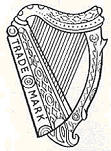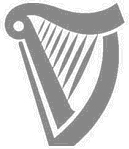
The harp, which serves as the Guinness emblem, is based on a famous 14th century Irish harp known as the "O'Neill" or "Brian Boru" harp which is now preserved in the Library of Trinity College Dublin. The harp device has been synonymous with Guinness since 1862 when it was used as a symbol on the first bottle label for GUINNESS®. It was registered as a Guinness company trademark in 1876. It is because of the harp trademark that Guinness named its first lager 'Harp' in 1960.

1862 harp

current harp
The harp is one of three elements that make up the GUINNESS® livery. The other two elements are the GUINNESS® word and Arthur Guinness's famous signature. There have been a number of changes to the design of the harp device over the years including a reduction in the number of strings shown. The current harp was introduced in 2005 when a new brand livery was launched.
The harp is also the official national emblem of the Republic of Ireland and can be found on the Republic's coinage. However, there is a difference between the Irish government harp and the Guinness harp. As Guinness had trademarked the harp symbol in 1876, the Irish Free State Government of 1922, had to turn the official government harp the other way to differentiate between the trademarked Guinness harp and the official State emblem. The distinguishing feature between the two harps is that the Guinness Harp always appears with its straight edge (the sound board) to the left, and the government harp is always shown with its straight edge to the right.
If you have any further questions about the history of Guinness please contact them at:
Guinness Archive, GUINNESS® STOREHOUSE, St. James's Gate, Dublin 8
Telephone: +353 1 471 4557
Email: guinness.archives@diageo.com
Opening Hours: Mon - Fri 09:30 to 17:00
The GUINNESS and GUINNESS STOREHOUSE words and associated logos are trade marks